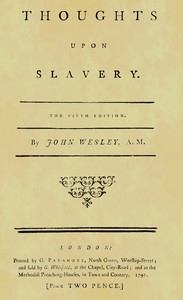Thoughts upon slavery by John Wesley
"Thoughts upon Slavery" by John Wesley is a polemic essay written in the late 18th century. This work examines the moral and ethical implications of slavery, particularly focusing on the African slave trade and the conditions faced by enslaved individuals. Wesley, a prominent theologian and founder of Methodism, uses his platform to advocate against the dehumanizing practices associated with slavery. In this work, Wesley argues that slavery is a violation of natural
justice and moral decency, criticizing the systems of procurement and treatment of enslaved Africans. He details the forceful capture of individuals during wars and the brutal conditions they endure during transportation and in the plantations of America. Citing historical context, Wesley highlights the flourishing societies native to Africa before the arrival of Europeans who brutalized and exploited them. He vehemently rejects the notion that any form of servitude can be justified, stating that both Biblical and human laws cannot condone the ownership of fellow human beings. Ultimately, Wesley's impassioned plea is a call to conscience, urging his contemporaries to recognize the inherent rights of all humans and to act with compassion and justice toward those who are oppressed. (This is an automatically generated summary.)
Read or download for free
| How to read | Url | Size | |||
|---|---|---|---|---|---|
| Read now! | https://www.gutenberg.org/ebooks/68144.html.images | 85 kB | |||
| EPUB3 (E-readers incl. Send-to-Kindle) | https://www.gutenberg.org/ebooks/68144.epub3.images | 327 kB | |||
| EPUB (older E-readers) | https://www.gutenberg.org/ebooks/68144.epub.images | 326 kB | |||
| EPUB (no images, older E-readers) | https://www.gutenberg.org/ebooks/68144.epub.noimages | 131 kB | |||
| Kindle | https://www.gutenberg.org/ebooks/68144.kf8.images | 364 kB | |||
| older Kindles | https://www.gutenberg.org/ebooks/68144.kindle.images | 352 kB | |||
| Plain Text UTF-8 | https://www.gutenberg.org/ebooks/68144.txt.utf-8 | 70 kB | |||
| Download HTML (zip) | https://www.gutenberg.org/cache/epub/68144/pg68144-h.zip | 291 kB | |||
| There may be more files related to this item. | |||||
Similar Books
About this eBook
| Author | Wesley, John, 1703-1791 |
|---|---|
| Title | Thoughts upon slavery |
| Original Publication | United Kingdom: G. Paramore,1792. |
| Note | Reading ease score: 68.8 (8th & 9th grade). Neither easy nor difficult to read. |
| Credits | Thomas Frost and the Online Distributed Proofreading Team at https://www.pgdp.net (This file was produced from images generously made available by The Internet Archive) |
| Language | English |
| LoC Class | HT: Social sciences: Communities, Classes, Races |
| Subject | Slavery -- Early works to 1800 |
| Category | Text |
| EBook-No. | 68144 |
| Release Date | May 21, 2022 |
| Copyright Status | Public domain in the USA. |
| Downloads | 103 downloads in the last 30 days. |
| Project Gutenberg eBooks are always free! | |

